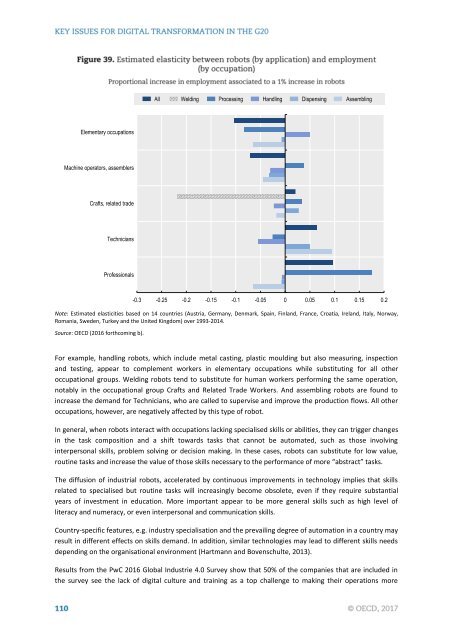KEY ISSUES FOR DIGITAL TRANSFORMATION IN THE G20
2jz0oUm
2jz0oUm
Create successful ePaper yourself
Turn your PDF publications into a flip-book with our unique Google optimized e-Paper software.
All Welding Processing Handling Dispensing Assembling<br />
Elementary occupations<br />
Machine operators, assemblers<br />
Crafts, related trade<br />
Technicians<br />
Professionals<br />
Note: Estimated elasticities based on 14 countries (Austria, Germany, Denmark, Spain, Finland, France, Croatia, Ireland, Italy, Norway,<br />
Romania, Sweden, Turkey and the United Kingdom) over 1993-2014.<br />
Source: OECD (2016 forthcoming b).<br />
-0.3 -0.25 -0.2 -0.15 -0.1 -0.05 0 0.05 0.1 0.15 0.2<br />
For example, handling robots, which include metal casting, plastic moulding but also measuring, inspection<br />
and testing, appear to complement workers in elementary occupations while substituting for all other<br />
occupational groups. Welding robots tend to substitute for human workers performing the same operation,<br />
notably in the occupational group Crafts and Related Trade Workers. And assembling robots are found to<br />
increase the demand for Technicians, who are called to supervise and improve the production flows. All other<br />
occupations, however, are negatively affected by this type of robot.<br />
In general, when robots interact with occupations lacking specialised skills or abilities, they can trigger changes<br />
in the task composition and a shift towards tasks that cannot be automated, such as those involving<br />
interpersonal skills, problem solving or decision making. In these cases, robots can substitute for low value,<br />
routine tasks and increase the value of those skills necessary to the performance of more “abstract” tasks.<br />
The diffusion of industrial robots, accelerated by continuous improvements in technology implies that skills<br />
related to specialised but routine tasks will increasingly become obsolete, even if they require substantial<br />
years of investment in education. More important appear to be more general skills such as high level of<br />
literacy and numeracy, or even interpersonal and communication skills.<br />
Country-specific features, e.g. industry specialisation and the prevailing degree of automation in a country may<br />
result in different effects on skills demand. In addition, similar technologies may lead to different skills needs<br />
depending on the organisational environment (Hartmann and Bovenschulte, 2013).<br />
Results from the PwC 2016 Global Industrie 4.0 Survey show that 50% of the companies that are included in<br />
the survey see the lack of digital culture and training as a top challenge to making their operations more


